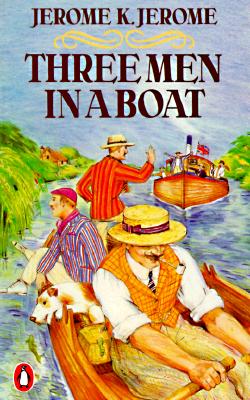Harris spoke quite kindly and sensibly about it.
The people at the Manor House did not wait to hear us talk. The landlady met us on the doorstep with the greeting that we were the fourteenth party she had turned away within the last hour and a half. As for our meek suggestions of stables, billiard-room, or coal-cellars, she laughed them all to scorn: all these nooks had been snatched up long ago.
Did she know of any place in the whole village where we could get shelter for the night?
“Well, if we didn’t mind roughing it—she did not recommend it, mind—but there was a little beershop half a mile down the Eton road—â€
We waited to hear no more; we caught up the hamper and the bags, and the coats and rugs, and parcels, and ran. The distance seemed more like a mile than half a mile, but we reached the place at last, and rushed, panting, into the bar.
The people at the beershop were rude. They merely laughed at us. There were only three beds in the whole house, and they had seven single gentlemen and two married couples sleeping there already. A kind-hearted bargeman, however, who happened to be in the tap-room, thought we might try the grocer’s, next door to the Stag, and we went back.
The grocer’s was full. An old woman we met in the shop then kindly took us along with her for a quarter of a mile, to a lady friend of hers, who occasionally let rooms to gentlemen.
This old woman walked very slowly, and we were twenty minutes getting to her lady friend’s. She enlivened the journey by describing to us, as we trailed along, the various pains she had in her back.
Her lady friend’s rooms were let. From there we were recommended to No. 27. No. 27 was full, and sent us to No. 32, and 32 was full.
Then we went back into the high road, and Harris sat down on the hamper and said he would go no further. He said it seemed a quiet spot, and he would like to die there. He requested George and me to kiss his mother for him, and to tell all his relations that he forgave them and died happy.
At that moment an angel came by in the disguise of a small boy (and I cannot think of any more effective disguise an angel could have assumed), with a can of beer in one hand, and in the other something at the end of a string, which he let down on to every flat stone he came across, and then pulled up again, this producing a peculiarly unattractive sound, suggestive of suffering.

